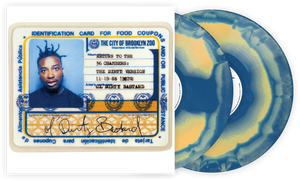


VOL № RH079 — March 2024
Return to the 36 Chambers: The Dirty Version
Ol' Dirty Bastard
COMING SOON: Return to the 36 Chambers: The Dirty Version by Ol' Dirty Bastard will be the March 2024 Hip-Hop Record of the Month. You're on the interest list and will be notified when it becomes available. Sign up to be notified by email when this album launches.
Unavailable - This product is currently unavailable. You're on the waitlist and will be notified if it becomes available. Join the waitlist to be notified if it becomes available again.
Unavailable - This product is currently unavailable. You're on the waitlist and will be notified if it becomes available. Join the waitlist to be notified if it becomes available again.
Wu-Tang Clan’s resident oddball Ol’ Dirty Bastard was on welfare and wasn’t afraid to let the world know. Rejecting nouveau riche posturing, unlike his mainstream rap peers, the Brooklyn native wore public assistance as a badge of honor on the front cover of his seminal 1995 debut, Return to the 36 Chambers: The Dirty Version. In all his wild-eyed glory, hip-hop’s ghetto superstar became the antithesis of traditionalist rappers and blankly stared into America’s judgment of welfare. Pocketing a hefty $45,000 advance from his record label, ODB represented his rugged origins with a defiance that would last throughout his entire career.
ODB’s chaotic originality made him a pantheon amongst hip-hop greats, even to those who didn’t understand at first listen. In the beginning was the Return.
LP 1 / Side A
| 1 Intro |
| 2 Shimmy Shimmy Ya |
| 3 Baby C'mon |
| 4 Brooklyn Zoo |
| 5 Hippa To Da Hoppa |
LP 1 / Side B
| 1 Raw Hide |
| 2 Damage |
| 3 Don't U Know |
| 4 The Stomp |
| 5 Goin' Down |
LP 2 / Side C
| 1 Drunk Game (Sweet Sugar Pie) |
| 2 Snakes |
| 3 Brooklyn Zoo II (Tiger Crane) |
LP 2 / Side D
| 1 Proteck Ya Neck II The Zoo |
| 2 Cuttin' Headz |
| 3 Dirty Dancin' |
| 4 Harlem World |





